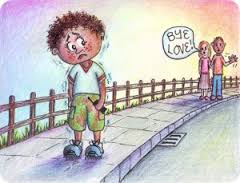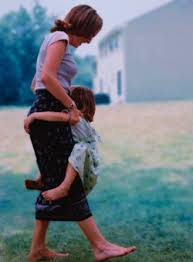 Fear of separation from the parent, is a normal developmental stage which all children go through. However if it persists and worsens beyond the age of two, then something is not quite right with the child. The term Separation Anxiety Disorder is sometimes used to describe this behaviour.
Fear of separation from the parent, is a normal developmental stage which all children go through. However if it persists and worsens beyond the age of two, then something is not quite right with the child. The term Separation Anxiety Disorder is sometimes used to describe this behaviour.
Retained Primitive Reflexes offer a profound insight into why this fear of separation behaviour persists.
Understanding fear of separation.
 It must be understood that there is a perfectly valid reason for a developing child to have a fear of separation. It is a survival program which forces the child to protect itself in the world. Without this a child who has just learned to walk, would happily wander away from it’s parents without realising it was in danger.
It must be understood that there is a perfectly valid reason for a developing child to have a fear of separation. It is a survival program which forces the child to protect itself in the world. Without this a child who has just learned to walk, would happily wander away from it’s parents without realising it was in danger.
As the brain develops in the growing child, the level of stress around separation decreases. The child learns that it can be OK for the parents to be away from them, as long as they still feel safe.
However, some children find this transition difficult. The reason for this is often related to the effect of Retained Primitive Reflexes. Specifically the Fear Paralysis reflex can have a profound effect on fear of separation. Please read the links provided to understand these reflexes and how they effect your child.
Fear of Separation and The Fear Paralysis Reflex
The Fear Paralysis Reflex is the first Primitive reflex to develop in the child. It involves withdrawal away from threat and should be integrated long before birth. If this reflex is not correctly integrated the effects on child behaviour are profound. It is said that to live with the Fear Paralysis Reflex is to see life through a lens of fear.
The child is living with an underlying fear or anxiety which they have absolutely no control over. The Reflex operates on an automatic, survival level in the brain and has no rational basis. A deep inexplicable fear is present in the child and they have no idea why.
Common themes of fear of separation in children
-
Fear that something terrible will happen to a loved one
-
Worry that an unpredicted event will lead to permanent separation.
-
Nightmares about separation.
-
Refuse to go to school.
-
Display reluctance to go to sleep.
-
Complain of physical sickness like a headache or stomach ache.
How can Cork Kinesiology help with Fear of Separation?
Tony Galvin is trained in The Child Centre Method – learning and behaviour program. The treatment of Retained Primitive Reflexes is at the heart of The Child Centre Method. Standardised assessments are used to establish the issues at hand as well as the related reflexes involved. A unique plan is then created for the child using this Integrated and Holistic approach. It is non invasive and fun for the child.

